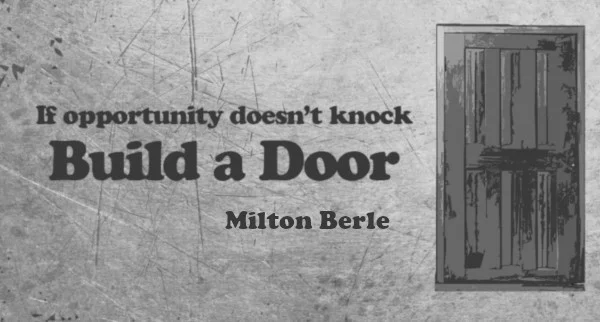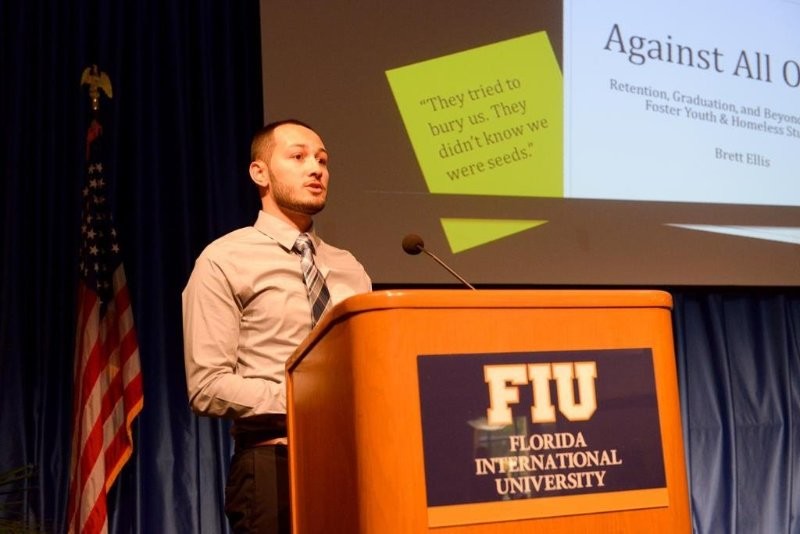Can’t Find an Internship? Create Your Own!
The majority of employers rank work experience/internships as the most important factor in their recruitment process. Those who complete internships within the same company they want to work for also have a huge competitive advantage for entry-level jobs than those with internships elsewhere. Internship experience provides an opportunity to develop necessary workplace skills that can’t be learned in the classroom.
So, what do you do if you can’t seem to land an internship with any company that interests you?
Create one!
"If opportunity doesn't knock, build a door." Milton Berle
I have personally done this and helped others to create their own internships as well. When I was in graduate school, I wanted to do another internship before I graduated. However, I didn’t want to do what everyone else was doing. I wanted to create an experience that would make me a very unique candidate in my job search. There was a fairly new office at my graduate school that helped assist former foster youth and homeless college students. I was fascinated to learn more about the access issues and barriers to higher education for this student population. This area was very new, so they didn’t have an internship program in place. I decided that I would create my own internship proposal to be sent to the area supervisor and my internship coordinator. It worked!
I also heard a story recently about a college student who wanted to work in social media management for a professional sports team. The recruiter told him that he would not be competitive without relevant experience. That student decided to create his own social media internship by volunteering to run social media for an athletics program at a local high school. When he came back the following year to speak to that recruiter, he had an entire portfolio of sports content, follower engagement, and tracking of the following he built from nothing. She hired him on the spot. Partially for the relevant experience, but also the coach-ability and willingness to learn that he showed her.
The downside to this approach is that you will more than likely be working unpaid (not always). I'm not an advocate for unpaid internships at all, but until that shifts, we have to adapt.
The plus side is that people rarely turn down free work. However, employers also don’t want the burden of needing to supervise an intern in an unstructured program. One of the best things you can do is create the internship program yourself. Below is a guide to help you put an internship proposal/description together.
Step 1
Start by listing out your overall internship objectives. These will be broad goals that you hope to work on that will help the organization. Focus on the needs of the employer because this is the part that will excite them about your additional help. Maybe you can find a contact person within the organization to give you some insight on new project they will be working on during the time frame you want to assist. Below is the example I created for the Fostering Panther Pride program at Florida International University. Yours will likely look very different, but this should help you to customize your own internship description.
Internship Objectives:
- Assist undergraduate students with admission, FAFSA, housing applications, as well as documents and processes required to apply for DCF and homeless tuition waivers.
- Gain a better understanding of the experiences of former foster youth and homeless students and the resources beneficial to them.
- Become familiar with federal, state, and local legislation affecting former foster youth and homeless youth.
- Become familiar with community partners and organizations whose mission is to provide support to foster and homeless youth.
- Make appropriate referrals for students with educational, career, or personal concerns, or skill/learning deficiencies.
Step 2
Because you are creating an internship, there should be a focus on what you would like to learn from the experience. It’s not only about gaining work experience. Begin to reflect on exactly what you want to learn out of the experience. This will give the organization an understanding of your motivations for potential 1-on-1 conversations or addition learning opportunities.
Professional Learning Goals:
- Knowledge Acquisition, Integration, and Application: Learn techniques and skills that will help former foster youth and homeless students in the areas of increasing access, retention and graduation, and employment and/or further education.
- Interpersonal Competence: Understand the importance of relationship building and communication between this student population and various stakeholders. Interact with and present workshops to former foster youth and homeless students as well as professional staff and community partners.
- Higher Education Competencies: Practice strategies to best assist students by implementing developmental programs, facilitating academic interventions, and using assessments to evaluate program effectiveness.
Step 3
The next area will focus on specific tasks and assignments that you have planned. These tasks should relate to both the Internship Objectives and Professional Learning Goals. You may need to do more research before developing this area. You could set up a brief informational interview over the phone or in person with the organization to learn more about what they do before working on this step.
Developmental Tasks:
- Shadow 1-on-1 sessions with Fostering Panther Pride Success Coach
- Design and facilitate academic and life skills workshops
- Communicate with academic advisors to track students’ academic progress, and create educational/career plans
- Create promotional materials for Fostering Panther Pride outreach and recruitment
- Attend and present at workshops, college fairs, conferences to recruit and inform participants about Fostering Panther Pride
- Serve as a co-advisor to H.E.R.O.E.S. student organization
- Attend Our Kids Check Days
- Collaborate with the Office of Retention and Graduation Success to assess program success
This internship was one of the best work experiences I have ever had. I’m also convinced that it’s the reason I landed my first job outside of graduate school. It went so well, that I was asked to speak at my graduation about working with this specific student population.



